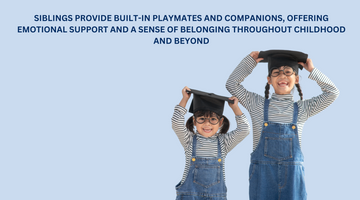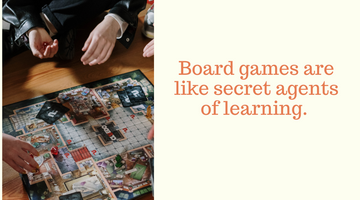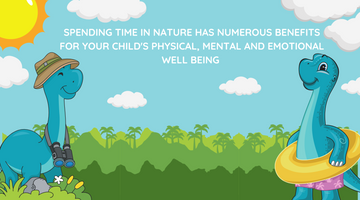Siblings play a significant role in a child's development, offering both benefits and challenges. From companionship and social skills development to rivalry and conflict resolution, the sibling relationship shapes a child's upbringing in unique ways. This blog post explores the advantages siblings bring to child development, along with the challenges parents may encounter in fostering a positive sibling dynamic.
Benefits of Sibling Relationships :
- Companionship and Emotional Support: Siblings provide built-in playmates and companions, offering emotional support and a sense of belonging throughout childhood and beyond. Having a sibling can combat feelings of loneliness and provide a lifelong source of friendship and support.
- Social Skills Development: Interacting with siblings allows children to develop crucial social skills, such as sharing, taking turns, and cooperation. Siblings provide an informal and safe environment for practising communication, conflict resolution, and negotiation skills.
- Empathy and Understanding: Sibling relationships foster empathy and understanding as children learn to navigate different perspectives, emotions, and needs. Siblings often share experiences and develop a deeper understanding of each other's strengths, weaknesses, and feelings.
- Emotional Intelligence: The emotional bond between siblings helps develop emotional intelligence. Children learn to recognize and regulate their own emotions, empathise with their siblings, and respond appropriately to their feelings. They develop skills such as active listening, empathy, and expressing emotions effectively.
Checkout our blog - Parenting Styles: Finding the Right Approach for Your Child’s Well Being
Challenges in Sibling Relationships:
- Sibling Rivalry: Sibling rivalry is a common challenge that arises from competing for parental attention, resources, and affection. Siblings may argue, fight, and engage in power struggles. Parents must address conflicts, promote fairness, and teach conflict resolution skills to help siblings navigate their rivalry in a healthy manner. Encouraging cooperation, setting clear expectations, and providing individual attention can help reduce rivalry and foster a more harmonious relationship.
- Age and Developmental Differences: Siblings may have different interests, abilities, and developmental stages, leading to challenges in finding common ground. Older siblings may feel burdened with caregiving responsibilities, while younger ones may feel left out. Parents should encourage respect for individual differences and facilitate activities that accommodate each child's unique needs. Encouraging shared experiences, finding common interests, and promoting sibling collaboration can help bridge the age and developmental gaps.
- Power Struggles: Siblings may engage in power struggles and vie for dominance within the family. They may compete for attention, resources, or parental approval. Parents can foster cooperation by assigning shared responsibilities, promoting collaboration, and establishing clear expectations and consequences for negative behaviours. Encouraging fairness, teaching problem-solving skills, and providing opportunities for each child to have a voice can help mitigate power struggles.
- Comparison and Identity Formation: Siblings often face comparisons, whether from parents, relatives, or society. These comparisons can impact a child's self-esteem and identity formation. Parents should focus on celebrating individual strengths and promoting a sense of uniqueness in each child. Encouraging siblings to support and appreciate each other's accomplishments, emphasising personal growth over competition, and discouraging favouritism can help foster positive self-esteem and healthy identity development.
Siblings play a vital role in a child's development, offering numerous benefits while presenting challenges for parents to navigate. The companionship, social skills development, empathy, and emotional intelligence fostered through sibling relationships are invaluable. By understanding and actively fostering healthy sibling relationships, parents can create a supportive environment that enhances their children's overall development and well-being.






